-------Lingyin Temple organized Themed Tea Party For Filial Piety and Gratitude
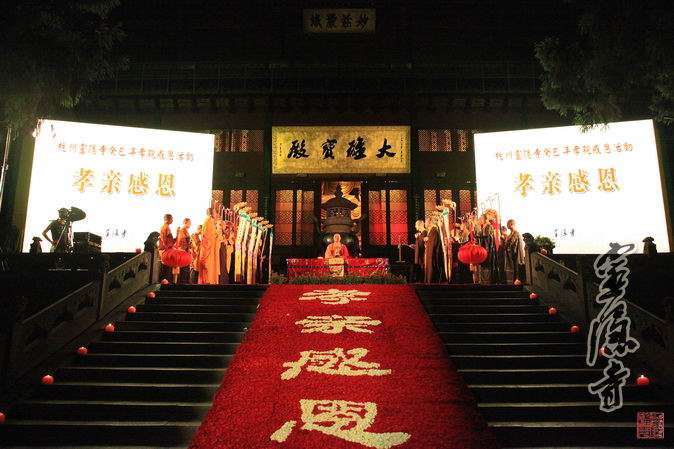
Promoting filial piety and gratitude
The fifteenth of July of Chinese lunar calendar is not only the Buddha Joy Day, on which the Buddhist summer retreat ends, but also Ullambana Dharma Assembly, on which people are reminded of filial piety and gratitude to their family.
On 20 August, 2013, or the fourteenth of July of Chinese lunar calendar, Lingyin Temple invited parents and families of all Venerables to the temple for the Themed Tea Party for Filial Piety and Gratitude, so as to promote filial piety, which is encouraged by Buddhism, and to carry on the Chinese tradition of respecting one’s parents even after their death. During this event, the Venerables themselves serve tea and hot beverage to their parents whole-heartedly, so as to carry out their filial duties. For this event, famous TV anchor Wang Xiaolei was invited as the host, and Venerable Guangquan was present at the event to preach to as many as 500 attendees. It was the first time that Chinese temples organized events to promote filial piety through reunions of monks and their parents.
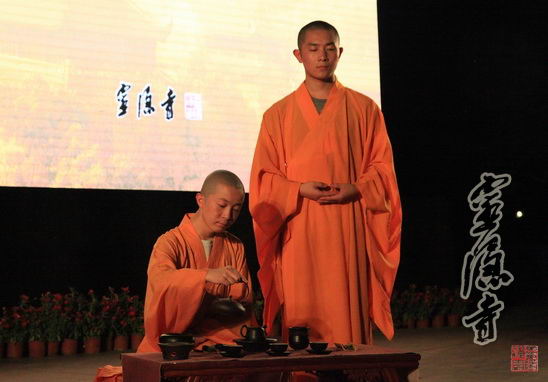
Reverence to Buddha with Chan tea ceremony

Welcoming Venerable Guangquan
At seven o’clock in the evening, the Themed Tea Party for Filial Piety and Gratitude began in the clear, solemn sound of clappers. After a short Chan tea ceremony to show respect to Buddha, the audience invited Venerable Guangquan for Dharma talk.
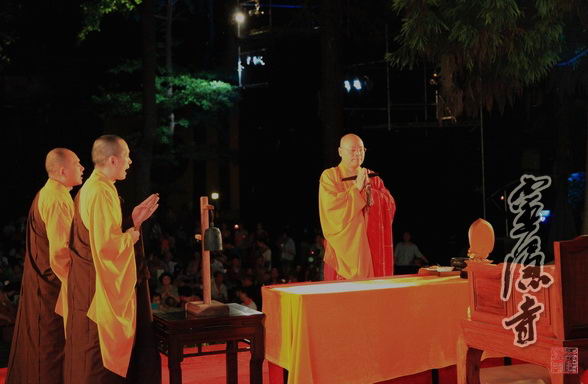
Paying respect to Buddha
Venerable Guangquan, in a merciful manner, presented to the audience the origin of Ullambana Dharma Assembly, which comes from the story of Maudgalyayana who saved his mother, a suffering Preta. According to Venerable Guangquan, one purpose of this event organized by Lingyin Temple is to make people aware that the taking of Buddhist vows to become monks does not equate the rejection of filial piety. Being a monk or not, one has to practice filial piety and to shoulder relevant responsibilities, so as to obtain good karma. Those who have become monks are practicing a greater filial piety in the sense that they pursue the freedom of their parents from the samsara, and from the ocean of misery. Venerable Guangquan also thanked the parents’ understanding and support for the Venerables, who are practicing good karma to be filial in a greater sense. The other purpose of the event is, through the reunion of monks and their parents, to promote filial piety, to draw societal attention to the elderly living in “empty nests”, to encourage people to visit them and fulfill filial duty, so that the filial gratitude is paid to the parents, and the cultural tradition of filial piety is passed on, everlastingly, from generation to generation.

Venerable Guangquan mercifully presented the Buddhist story of filial piety and gratitude
During the Tea Party, following the careful lead of the host, three Lingyin Venerables, Zongniao, Guoyuan and Faguang, told their own stories as filial children. They also shared their own experiences of how they overcame various difficulties so as to obtain understanding from parents and families, in order to convert to Buddhism and practice the greater filial piety in the liberated, Buddhist world.
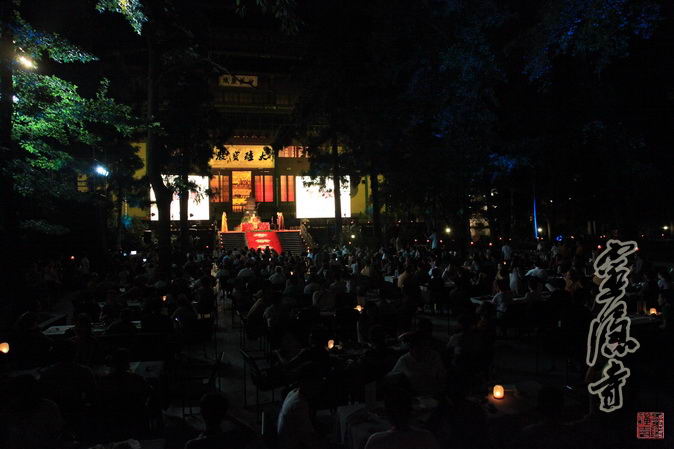
The ancient temple, the old tree and souls of ancestors coming to one commemorate the tradition of filial piety with contemporary believers
These Venerables come from very different background - some born by engineer parents, some from rural families, some from areas where people believe in Tibetan Buddhism and take pride in becoming monks. With sympathy from other Venerables, family members, believers and volunteers among the audience, they told their stories of practicing filial piety as monks in different ways, which brought the audience to tears; their stories of overcoming difficulties on the way towards Buddhism, which took the audience up and down; and their stories of finally achieving the understanding of their families, converting to Buddhism without concerns and paying gratitude by practice, which brought the audience great relief.
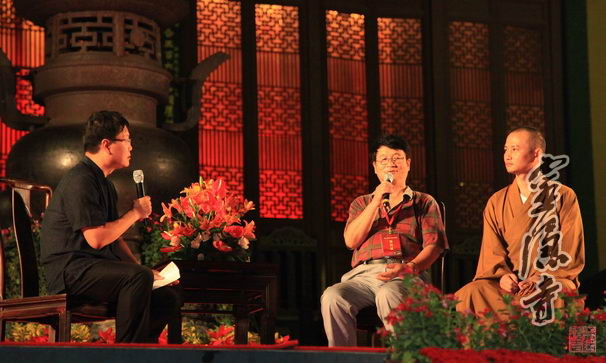
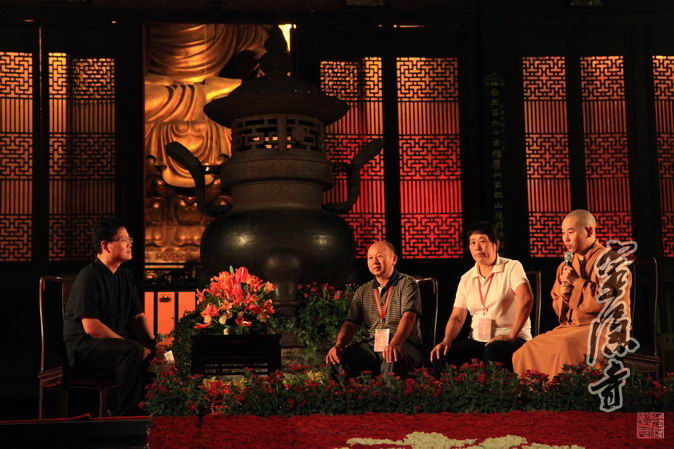
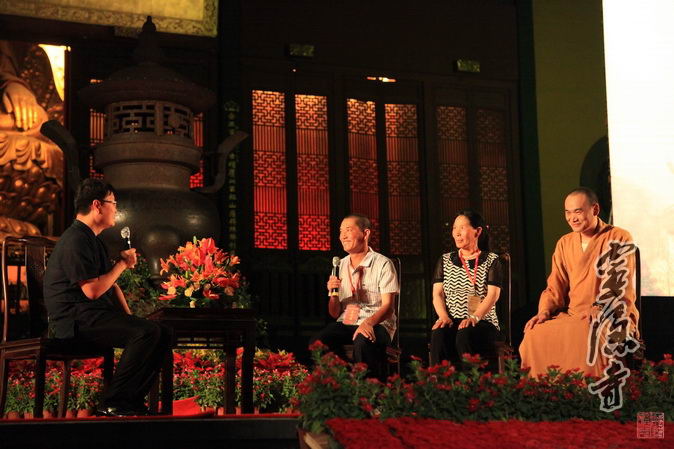
Three Venerables from Lingyin Temple in interview with their families
During the Tea Party, the Venerables served their parents and family members three types of tea: Rock Tea, Longjing Tea, and Iron Guanyin. The names of the three types of tea coincided with the level and state of Buddhist attainment. The Rock Tea, as a product from the depth of the mountains, symbolizes the diverse origins of the monks; Longjing, growing right next to West Lake, symbolizes Lingyin Temple, where the monks gather for Buddhist practice; Iron Guanyin symbolizes the prajna (wisdom) and the Buddhahood that the monks seek through practice. It is after such attainment that the monks would be able to fight against all evil, like Buddha’s warrior attendants, and to wash away the bad karma of their parents and families just like the holy water, so as to liberate them as well as themselves.
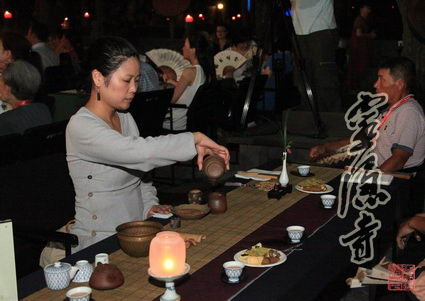
Pious volunteer performing tea ceremony

Family members of Venerables watching interviews

Venerable Guangquan (first on the left) sitting together with other venerables, their family members and believers
In candle light and moonshine, and the presence of other Chan Buddhists, Venerables and their families sat around the tables under ancient trees in Lingyin Temple, drinking tea and chatting. In the faint scent of the tea, fading melody of the flutes, and the accented-tainted whispers, they felt their hearts closer than ever before. At that very moment, it was only advaya, the ultimate Buddha-nature that lingered in the air, uniting the saints and the sinners.
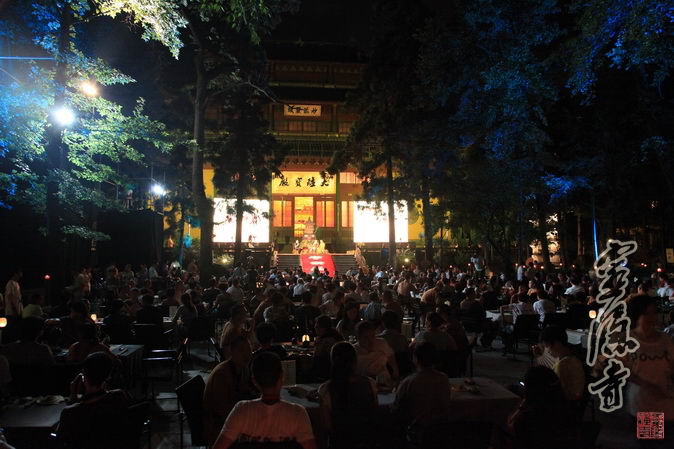
Discussing filial piety and gratitude over tea
9:45pm, the Themed Tea Party for Filial Piety ended in the solemn melody of Triratna Song.

The melody of Triratna Song lighting up the darkness